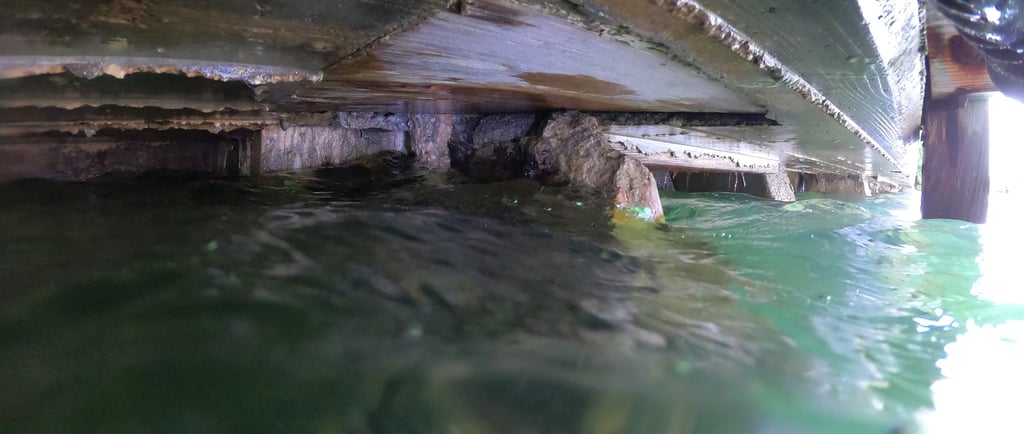Expert Engineering Reports for Comprehensive Seawall Inspections, Repairs, and Full Construction.
Why Real Estate Agents Should Prioritize Seawall Inspections
When dealing with waterfront properties, real estate agents face unique challenges beyond the typical considerations of a sale. Among these, the condition of a property’s seawall is often overlooked but is critically important. A seawall acts as the first line of defense against erosion, flooding, and structural damage caused by water, ensuring the property remains safe and valuable. Prioritizing seawall inspections is not just a best practice—it’s a responsibility that can safeguard agents, buyers, and sellers alike.
11/22/20244 min read


The Role of Seawalls in Waterfront Properties
Seawalls are specialized barriers that protect properties situated along bodies of water. They guard against the constant battering of waves, rising tides, and potential storm surges. Without a sturdy and well-maintained seawall, the property is vulnerable to erosion, flooding, and even structural instability.
Why Seawalls Degrade Over Time
Constant Exposure to Water: Saltwater accelerates the corrosion of materials like metal and concrete.
Weather Conditions: Storms and heavy rains place immense stress on seawalls.
Lack of Maintenance: Neglecting inspections and repairs can lead to gradual but severe damage.
To better understand the structural issues that lead to deterioration, see the common causes of seawall failure in South Florida.
To understand the repair options available when these issues occur, check out this comprehensive guide to seawall repair.
Why Real Estate Agents Must Prioritize Seawall Inspections
1. Protecting Property Value
The presence of a solid, well-maintained seawall significantly affects the market value of a waterfront property. Conversely, a deteriorating or compromised seawall can result in steep price reductions or the property becoming unsellable altogether.
Example
An inspection might uncover minor cracks that can be easily repaired. Addressing these issues early could prevent the seawall from failing entirely, saving the seller thousands and maintaining the property’s value.
2. Ensuring Safety and Peace of Mind
A compromised seawall is a safety hazard. If a seawall fails, the resulting flooding or erosion can cause significant damage not only to the property but also to neighboring areas. By recommending a seawall inspection, real estate agents demonstrate their commitment to protecting buyers from potential disasters.
3. Streamlining the Sales Process
Unresolved seawall issues discovered late in the sales process can delay closing or lead to costly renegotiations. Prioritizing an inspection early eliminates surprises and helps transactions proceed smoothly.
4. Building Trust with Clients
Recommending a seawall inspection shows that a real estate agent is knowledgeable and prioritizes their client’s best interests. This transparency builds trust and reinforces the agent’s reputation as a credible and reliable professional.
5. Avoiding Legal Risks
If a buyer discovers seawall damage after the purchase, they could hold the seller—and potentially the agent—liable for nondisclosure. An inspection ensures that all parties are fully informed and reduces the likelihood of legal disputes.
What Does a Seawall Inspection Involve?
A professional seawall inspection provides an in-depth analysis of the structure’s integrity and functionality. Here’s what inspectors typically assess:
Structural Stability: Identifying cracks, bulges, or leaning sections.
Drainage Systems: Ensuring proper water flow to relieve pressure behind the wall.
Material Condition: Examining for corrosion, erosion, or decay.
Erosion Control: Assessing the effectiveness of soil stabilization behind the seawall.
Anchoring System: Checking for secure attachments to prevent wall movement.
How to Spot Warning Signs of Seawall Damage
Real estate agents can benefit from recognizing early signs of seawall damage, which may include:
Cracks or gaps in the seawall structure.
Rust stains or corroded metal components.
Soil erosion or sinking ground near the seawall.
Water pooling or increased flooding near the property.
If any of these issues are present, agents should encourage the property owner to schedule a professional inspection immediately.
Who Should Conduct the Inspection?
It’s essential to hire a certified seawall inspector or marine engineer with experience in coastal and waterfront properties. Their expertise ensures a thorough assessment and an accurate report that real estate agents and clients can trust.
The Cost of Neglecting Seawall Inspections
Financial Consequences
Neglected seawall issues can escalate into costly repairs or even total replacement, which can range from $10,000 to $100,000 depending on the severity of the damage. This financial burden often falls on the seller or buyer, leading to frustration and potential deal cancellations.
Legal Risks
Without proper disclosure of seawall conditions, sellers and agents risk lawsuits, tarnishing reputations and incurring penalties.
Benefits of Prioritizing Seawall Inspections
For Sellers
Increased property value with a certified inspection report.
Faster sales with fewer renegotiations.
For Buyers
Confidence in the property’s safety and longevity.
Protection from unexpected repair costs.
For Agents
Enhanced credibility and trustworthiness.
Smooth transactions and satisfied clients.
Real-Life Case Studies
Case 1: The Inspection That Secured a Sale
A waterfront property in Miami had been on the market for months without offers. A seawall inspection revealed minor erosion, which the seller repaired. The property sold within weeks for 10% above the initial asking price.
Case 2: The Lawsuit That Could Have Been Avoided
A buyer in California purchased a waterfront home without an inspection. A year later, the seawall failed, causing severe flooding. The buyer sued the seller and the agent for nondisclosure, resulting in costly legal fees and damages.
FAQs
Why is a seawall inspection necessary for waterfront properties?
A seawall inspection ensures the structural integrity and safety of the property, protecting its value and preventing future liabilities.
Who typically pays for the seawall inspection?
In most cases, the seller pays for the inspection, but this can be negotiated in the sales agreement.
How often should seawalls be inspected?
Experts recommend inspecting seawalls every 5 to 7 years or more frequently in areas prone to extreme weather.
Can seawalls be repaired instead of replaced?
Yes, minor damage can often be repaired. However, severe damage may require a complete replacement.
What is the average cost of a seawall inspection?
Costs range from $700 to $2,000 depending on the property’s location and seawall size.
What happens if seawall damage is found?
Inspectors will provide a detailed report outlining necessary repairs, which can then be addressed before selling the property.
Conclusion
Seawall inspections are not merely optional—they’re essential for any real estate transaction involving waterfront properties. By prioritizing inspections, real estate agents can protect property value, ensure safety, and foster trust among clients. This proactive approach not only leads to smoother transactions but also enhances an agent’s reputation as a knowledgeable and reliable professional.
Don’t let overlooked seawall issues jeopardize your next deal—make inspections a priority today.
© 2012-2024 Souffront Contractors & Engineers | All Rights Reserved
Estimates@souffrontcontractors.com
Phone: 877-420-7220
© 2024. All rights reserved.


